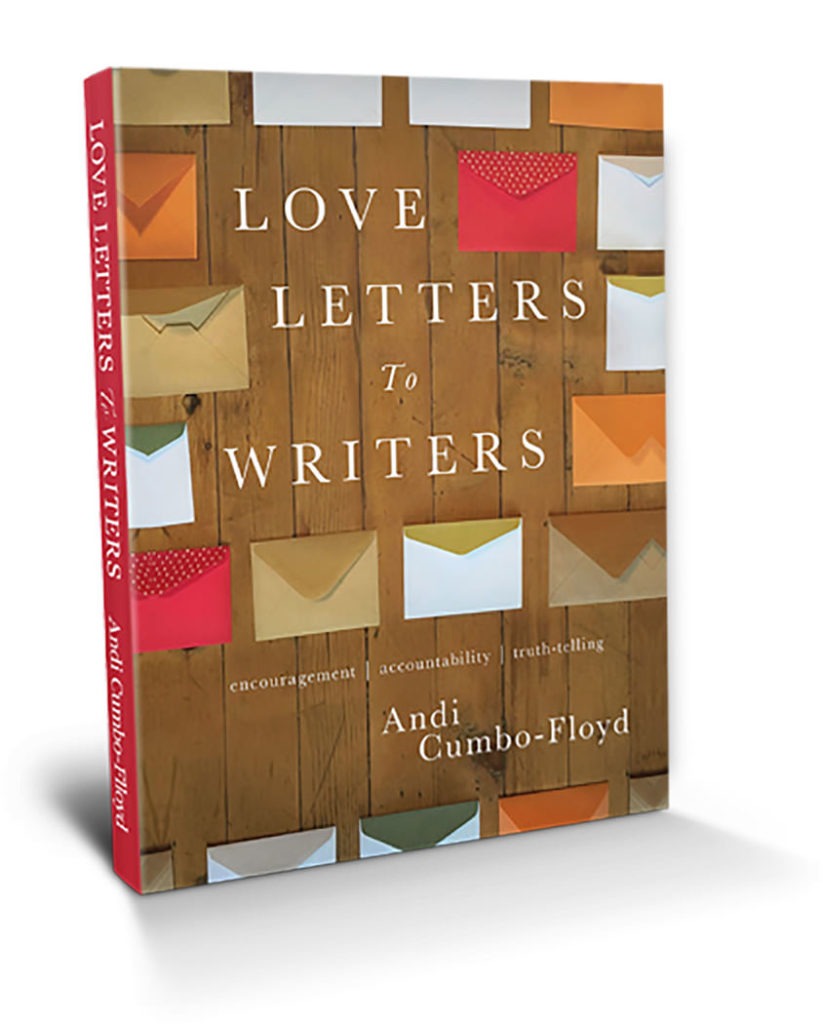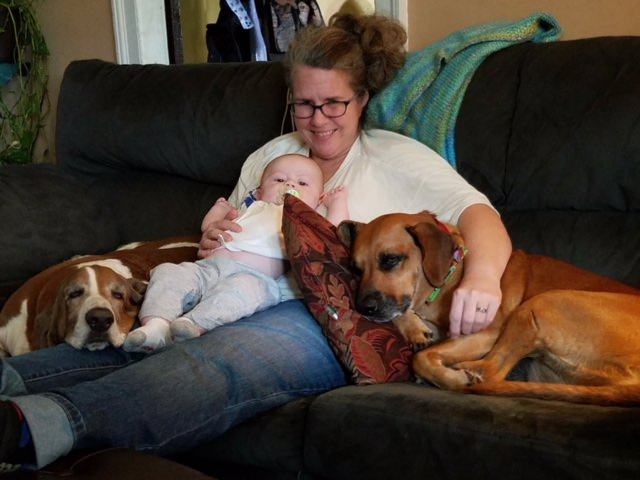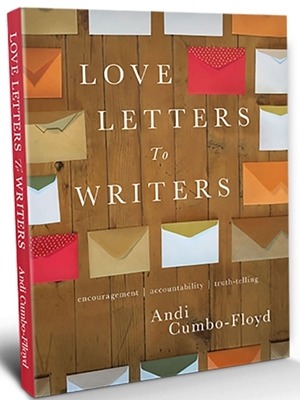
Andi Cumbo-Floyd is a writer I’ve followed for quite some time now. A prolific author, she’s written several books such as the historical, The Slaves have Names, life on the farm in God’s Whisper Manifesto, and for the YA reader, Steele Secrets – A Young Adult Ghost Story.
Since she has a new baby in the house, I appreciate the time she set aside to answer my questions. The book we’ll discuss today is entitled Love Letters for Writers, and you’ll find a sample at the end of the interview.

Author Andi, Milo and Friends
Author Bio
In addition to being an author, she’s also an editor and farmer who lives at the edge of Virginia’s Blue Ridge Mountains with her husband, son, four dogs, three cats, six goats, and thirty-two chickens. God’s Whisper Farm has become a retreat for writers, musicians, and other folks who need rest.
Author Interview
1) What inspired you to write this book?
I’ve been coordinating an online writing community for over two years now, and each week, I write those writers a letter. It’s about something that I’ve been considering, something that has come up in our conversations, or something I’ve read online. The letters are written just for those folks, many of whom I know very well, and so they are deeply personal to me. One of those people, Amanda Eastep, suggested I compile the letters into a book because many writers would benefit from them, so that’s what I did last summer. I took 52 of the letters to the community and put them into a book so that writers can read them at their pace, or even take them one a week as part of their writing practice.
2) What do you think is the #1 most difficult thing about being a writer?
My answer to this question changes with the day. Right now, I’d say it’s keeping the time to do it with so many other demands. I’m the mother of a four-month-old, so it’s hard to find time in my days for anything beyond him, much less writing that doesn’t always pay the bills. For other folks, it’s a full-time job or volunteer work. Or things that seem easier than writing—like washing the windows on a skyscraper by hand without a lift.
3) Do you have any tips to fit writing into our busy lives?
We all have the same amount of time in our days, so keeping the time for it—holding that space—is all about choices. Not easy choices, but choices nonetheless. For a lot of people, choosing to write first thing in the day, maybe only after making coffee works well. But that doesn’t work for everyone. The key is, as I see it, setting aside times for writing and holding those times as sacred, even when it means saying no to other things. I also think we have to often choose to not do other things—including spend time with our families on occasion—in order to fit writing in. If we’re not willing to carve out the space, to make the hard choices to give writing space, then we aren’t going to write. And that’s okay, but the choice is ultimately our own.
4) How hard has it been to write with a new baby in the house?
Well, right now, he’s just discovered that he can kick his play gym and make all this “friends” dance above his head. So I have a couple of minutes here. But it is hard. We’re still in the days when he doesn’t sleep through the night, and so I’m pretty sleep-deprived, which makes it hard to concentrate enough to write much. Since I’m his primary caregiver during the day, I have to squeeze all my work—writing, editing, balancing our checkbook—into the times when he’s playing or in his far-too-short naps. So it’s tough, but not impossible. And it will get easier when I sleep more. 😉
5) Is our writing really important? Do people even read any more?
I believe writing is so important because I believe stories are the way we make meaning in the world. So each person’s way of making meaning—their stories—are crucial for helping us understand not only the writer but the broader world. So yes, our writing is REALLY important.
And yep, people do read. Lots of people read books, although my perspective on how many is probably skewed since I am drawn to bookish people. But people read online, they read on their phones, they read in the bathroom. People do read—in different ways than they used to—but it’s still reading. Our work is to find OUR people who want to read OUR stories and write in the places where those people read. That’s no small feat, but it is doable.
6) What advice would you give to a newbie writer?
No one is going to make the choice to write except you. No one is going to come beg for your story, so you have to put it out there. Again and again and again. Persistence will trump talent and luck any day.
7) What’s next on your writing agenda?
I have some inklings about a couple of essay projects and a book project. They deal with the place I am in life—a first-time mother at 43, a farm owner, a writer. So I’m just writing around to find where my pen sinks in, and I’ll go long then.
Excerpt
Here’s the text from the second letter in the book:
Go Wild!
Dear Beautiful People,
Just now, over the top of our barn and through the pines beyond, the sun is rising in the brightest of yellows against the steel-white winter sky. He’s not shy, this guy. He’s burning with all the brightness he can muster, and we are grateful—for the way his presence is used to bring us life.
I wonder if maybe the best thing we can do as writers is to burn the same way when we draft our work . . . to let it all go, to write without boundaries, without worrying about who we might burn, about what we look like, about how the light of our words hits someone. We just write wild . . . big and wild, like a fire.
I’ve said it before, and I’ll probably say it one thousand times—the brain is not the place from which we get our best word-energy. That energy lives in the heart, and often, to get at the heart, we have to let our brains take a break, step to the rear, steep in silence a bit. When we are trying to control, manipulate, anticipate, we are thinking—we are girding—we are worrying . . . and worry has no place in the fire of first drafts.
There will be time enough for worry, to gain control, to tame the fire later.
But now, in the first stages of writing, we need to write WILD, our arms flung wide as we spin with the words. Wild and free.
So that’s my challenge for you—live into that much-rephrased axiom of writing: write hot; edit cold. In that draft, let your characters, your language, your passion, your emotion burn white hot . . . Later you can come apply the cool, controlled light of reason. But now, let it all go . . . be wild. Big and wild.
What keeps you from writing wild in your drafts? What holds you back? What do the ugly voices whisper? What might it feel like to let go?
Much love,
Andi
Visit Andi
Website/Blog
Gods Whisper Farm
Love Letters to Writers
Amazon Author Page
Linked In
Thanks for visiting and sharing with us! Make sure to visit Andi at her social sites, and order your copy of Love Letters to Writers to have on hand for daily doses of encouragement and inspiration.
On another note, if you’re a writer and need some peace and quiet, check out this website for information on the yearly Writer’s Retreat at Andi’s farm, happening June 21-23, 2019. You’ll bump into some very special guests!
What is your biggest challenge as a writer? Tell us about it in the comments!

Penelope Silvers is a freelance writer, author,
and radio host of Penelope’s Book Chat on Blog
Talk Radio. She lives simply and sanely on Florida’s
beautiful nature coast.



06. Recent Comments